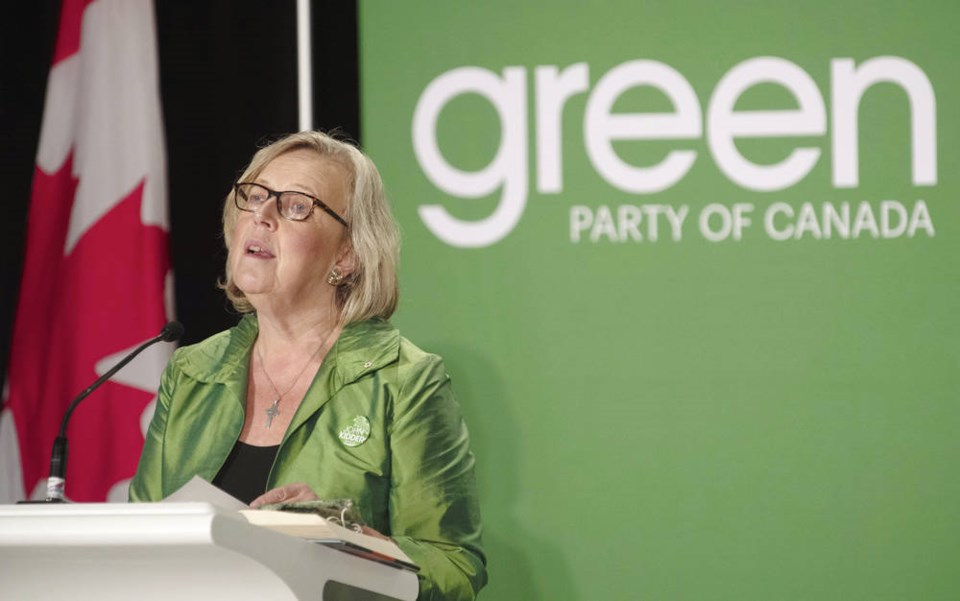The 2011 federal election campaign coincided with the Canucks’ run to the Stanley Cup finals. So, it was no surprise when those on stage at an all-candidates forum in Sidney joked about missing that night’s game on TV.
Except for the Green Party’s Elizabeth May. Instead, she said how sad she was to miss church on Maundy Thursday. For the Mary Winspear Centre audience, it was a flip-the-switch moment, reassuring them about who she was as a person.
Or, at least, they thought “OK, she’s not a nut” — a significant hurdle to clear given the Greens’ ongoing battle against their image, in some quarters, as a fringe party peppered with fringe characters. May won her seat that year, becoming the first elected Green MP in Canada.
Fast forward a decade.
This has not been a fun summer for May. On June 10, she saw Jenica Atwin, the only Green MP not from Vancouver Island, defect to the Liberals. Six days later May had knee-replacement surgery, followed by a difficult recovery.
Wednesday, when May was in the southern Gulf Islands, her husband John Kidder phoned to say a wildfire had come over a ridge and was now within sight of his Ashcroft farm.
It’s a different kind of firestorm that has raged since Atwin’s departure put focus on an internal party dispute triggered by clashing perspectives on Palestine. In the media, the infighting has been framed as a question of whether new, embattled Green leader Annamie Paul, who is Black and Jewish, is a victim of prejudice, or simply isn’t up to the job — either way, not a great look heading into a possible fall federal election.
Over the last month, much was made of May’s silence on the matter until, on Tuesday, she released a statement saying she felt compelled to dismiss rumours that she had been involved in the power struggles. “Our leader is Annamie Paul and only our members have authority to call that into question,” she said.
May, who in 2019 stepped down after 13 years as party leader, also said she was “well aware that if I do or say anything about internal party matters, the impact of my comments would be over-sized.”
Wednesday, she elaborated. It wasn’t just politics but post-surgical painkillers that kept her on the sidelines until this week, she said. She acknowledged how much the turmoil has hurt (“I’d be lying if I said it wasn’t heartbreaking”) but said the Greens also endured internal struggles when she was leader. “They just weren’t spilling out into the newspaper.”
She said she expects the election call to blow away the controversy. With the news full of stories of German floods, Lytton, smoke-choked skies, the heat dome and the hundreds of deaths it caused, Canadians are far more worried about a climate crisis than party infighting, she said.
“I don’t think the spate of negative coverage is going to make a dent when the writ drops,” she said. “This election is going to be a climate-emergency election.”
Politically, that should favour the Greens, she said, adding that she doesn’t know who makes her madder, politicians who deny climate change or those who accept it but lack urgency in acting. (“I increasingly see myself as a cranky, 67-year-old version of Greta Thunberg,” she said.)
But even as May painted this picture, there was word Wednesday that the fight between Paul and party brass was headed to court. That’s hardly likely to build faith in a party that still flirts with fringe status in much of the country.
That’s something we tend to forget down here in the lower lefthand corner of Canada. In 2019, May earned 49 per cent of the vote in Saanich-Gulf-Islands (where she plans to run again) and the party took 27 per cent on Vancouver Island as a whole (electing the Greens’ other MP, Nanaimo-Ladysmith’s Paul Manly) but it had just 6.5 per cent nationwide.
Yes, the Island tends to be (small g) greener than the rest of the country, but much of the (big G) Green success here has been due to May herself, to her image as being disarmingly warm and good-humoured, and not the sort of person you’re afraid to get stuck in a corner with at a (small p) party. That’s not the image the Greens are projecting now.
jknox@timescolonist.com



